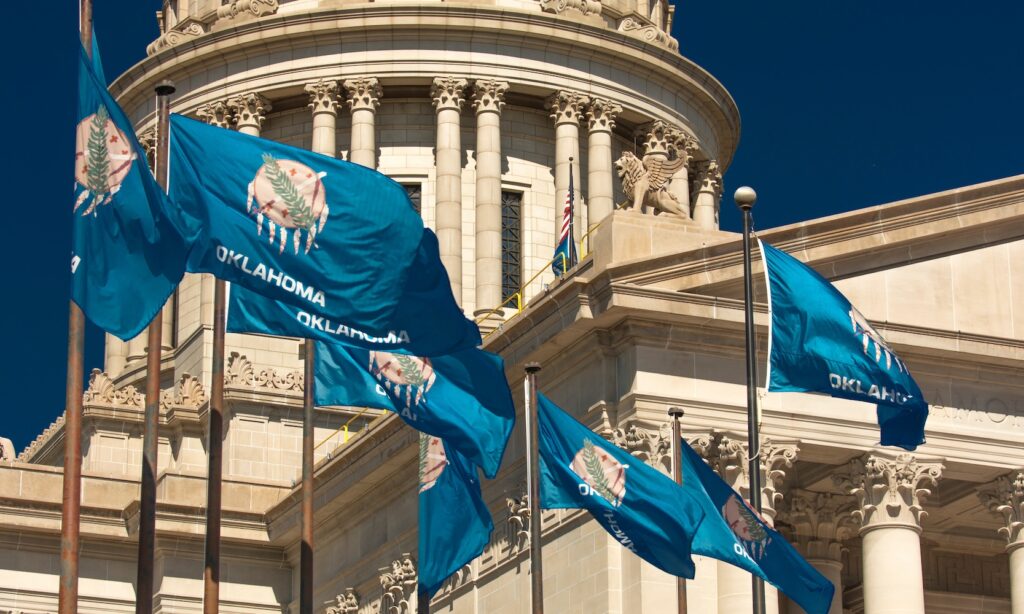Families to protest bill in Oklahoma attacking homeschool freedoms, parental rights
Families in Oklahoma are preparing to gather Feb. 6 at the state’s Capitol to express concerns over recent legislation that seeks to limit their educational freedoms.
State Rep. Amanda Swope,…

Families in Oklahoma are preparing to gather Feb. 6 at the state’s Capitol to express concerns over recent legislation that seeks to limit their educational freedoms.
State Rep. Amanda Swope, D-Tulsa, introduced House Bill 4130 in the third week of January. The bill would require parents to get government approval before homeschooling and, including background checks on parents, any adults living in the home, and any adults who may assist in the child’s schooling.
“Overall, this is a horribly invasive and unnecessary bill,” wrote members of the Constitutional Home Educators Alliance on the organization’s website. “It is beyond governmental overreach and has absolutely nothing to do with education.”
‘Regulation of homeschooling at an alarming rate’
Homeschool Oklahoma, a Christian homeschool association, has set up a legislative alert on its website regarding the legislation.
“This bill presents itself as an amendment to the Juvenile Code relating to deprived children,” the organization wrote. “However, it appears to us that its reach goes far beyond that.”
If passed, the bill would require parents to submit a “letter of intent” to the Oklahoma Department of Human Services (DHS), which must contain the parent’s full name and social security number, home address, and child’s name, among other information.
“If this bill is passed, we will see the door opening up for the regulation of homeschooling at an alarming rate,” the association wrote. “This bill will give the state a say in who can and cannot homeschool.”
The scope of information required for the letter of intent also raises concerns over privacy and data tracking, said the Constitutional Home Educators Alliance.
“You, your children, and every person, coop, organization, or church who might be involved in your home education will now be a part of the DHS database and it will have to be turned in twice a year,” it wrote.
The organization also contacted Rep. Swope, who reportedly replied, “With the correct language, all families that choose homeschooling will need to notify the state.”
When asked about data tracking concerns, Rep. Swope did not address the organization’s inquiries.
“How will this surveillance be enforced once the state has a list of homeschool families? Would the state have access to homeschool children? In what ways? What would the state do if denied access to our children?” the organization asked. “There was no response to those questions.”
Child abuse – ‘a slippery slope’
Parents also criticized the wording in the legislation, which reads in part:
“Requests to pursue instruction in the home shall not be authorized if there is a pending child abuse or neglect investigation against either custodial parent or a person instructing the child, or if either custodial parent or a person instructing the child has ever been convicted of domestic violence or child abuse or neglect.”
The wording contains too many loopholes and sets up “a slippery slope” that could deprive parents of due process and bar even well-meaning families from homeschooling, the alliance said.
“We have witnessed through the past 30 years parents who have been turned in by unhappy grandparents, nosy neighbors, vengeful ex-spouses, or even a disgruntled child, causing an investigation into their home life and home education,” members wrote. “Simply put, if there is even an accusal of neglect or abuse associated with any person involved in the child’s home education you will be denied the right to educate your child.”
Homeschool Oklahoma also took issue with the bill’s description, calling for “better language” to combat child abuse effectively.
“If abuse is happening in a home, there are laws already in place to take care of that,” the association wrote. “More laws are not needed. … Even though the bill starts out focusing on children in protective custody by the state, it ends with a direct attack on the freedom of homeschooling in Oklahoma.”
Ramifications for Christian schoolteachers
David Van Deusen, teacher at True Foundation Christian School, also has concerns over the legislation even though he doesn’t homeschool his children.
The full-time Christian school he works for allows homeschooled children to take specific courses there, and provides tutoring services for parents.
If the bill passes, every teacher at his school would need to be listed on every DHS report just for assisting other families with their homeschooling, he said.
“It’s like taking a free-running system and jamming the gears with as much dross, and as much of anything that could stop it up, as it could,” he told The Lion, calling it “major government overreach.”
Van Deusen also took issue with the DHS biannual checks outlined in the legislation, noting DHS is not involved at all in the state’s current homeschool law or enforcement.
If passed, the bill could heighten government bureaucracy with up to 24 reviews for each child from 1st to 12th grade, he said.
“I’ve heard some politicians talk about how bad education is in Oklahoma,” he said. “This would make it worse. … There is a partisan effort to control more of our individual lives than our Constitution of the United States has ever allowed.”
Van Deusen has had numerous interactions with homeschoolers from his professional teaching experience and debunked media narratives speculating about the potential of child abuse in homeschooling.
“Child abuse in its actual form, if it happens on a homeschool level, is not swept under the rug very easily,” he said, adding most homeschoolers engage with their community through co-operatives and other social groups. “If there was child abuse happening in one of those, it would not get ignored at all. It would get reported very quickly.”
Before his current position at a Christian school, Van Deusen taught in public schools for a time. He noticed students who struggled to meet minimum state requirements for education, including basic math computations for middle-school students.
“I did have quite a few students tell me, ‘Oh, I can’t divide,’ in 7th grade,” he said. “They had been through the elementary schools as well, as this was their first year in junior high.”
Van Deusen called that experience eye-opening and noted many parents are better with educating their kids than “some teacher who doesn’t know their child.”
“I realized during that time of teaching (as an elementary substitute and later a middle-school teacher) not just how much teachers have to do, but also how the students are treated,” he said. “And it’s not necessarily that someone even is abusing them. It’s simply they are being encouraged to just do the least that they can.”
Van Deusen ended the interview with an encouragement to parents, saying his educational experience had shown him how important they are to their children’s schooling.
“I do not like the fact this [legislation] also attempts to replace the role of the parent in deciding the education of each child,” he said. “The government does not have that right, and it will not be given that right.”



